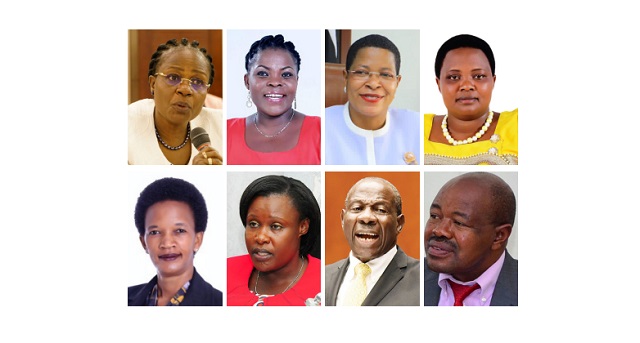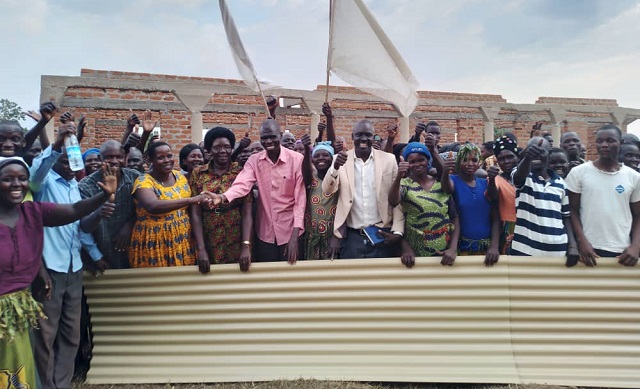
The puzzling secrets of the Karamoja iron-sheets saga
COVER STORY | THE INDEPENDENT | A Cabinet minister accused of drawing a pistol during an argument with a woman has resigned, Radio Uganda announced Wednesday.
President Yoweri Museveni accepted the resignation of Internal Affairs Minister Kahinda Otafiire ″because the National Resistance Movement government will not tolerate any indiscipline displayed by anybody regardless of his position, such as shown by Otafiire, ″ the state-owned radio said.
Otafiire was responsible for prisons, police and immigration departments. Radio Uganda did not say if he had been asked to resign.
The government-owned newspaper New Vision reported Wednesday that Otafiire argued with Jennifer Kuteesa at Fairway Hotel in Kampala, Uganda’s capital, on Oct. 15. Mrs. Kuteesa said she thought the matter was over until police began investigating the incident.
Otafiire was among those who joined Museveni in 1981 to form the National Resistance Movement, the political wing of the National Resistance Army. Museveni recently made Otafiire an honorary army colonel.
That report was filed by the Associated Press (AP), the American news agency, on Wednesday November 02, 1988. President Museveni had been in power for only two years and a sense of self-restraint and accountability to the public dictated the conduct of government official.
35 years later
Thirty-five later, it appears the display of indiscipline that Museveni spoke about in the Otafiire case is so pervasive by everybody regardless of position can get away unpunished.
As we write, the Vice President, Maj. Gen. (Retired) Jessica Alupo, the Speaker of Parliament, Anita Annet Among, the Prime Minister Robinah Nabbanja and a raft of other members of President Museveni’s cabinet are caught in a web of corruption, abuse of office, deception and denial in the so-called Karamoja iron-sheets saga.
The country is in shock that these high ranking government officials could sink so low as to snatch iron sheets intended for distributed to destitute citizens on Karamoja; the semi-arid north eastern region of the country renowned for its high poverty levels.
The theft was exposed after officials of the State House Anti-Corruption Unit arrested relatives of Minister for Karamoja, Mary Goretti Kitutu, with iron sheets clearly marked as relief. They allegedly attempted to sell the items on the open market.
Investigation have since confirmed that Minister Kitutu allocated herself 3000 pieces of iron-sheets intended for the poor. She also superintended over the distribution of the iron sheets to colleagues in cabinet and outside of government in what is being dubbed the “iron sheets bonanza”.
“It is sad for a minister who is a mother to sell items meant to help children of fellow mothers in Karamoja,” said MP John Bosco Ngoya of Bokora South in Karamoja.
The angry public, led by MPs from the Karamoja region, has said the leaders who are caught up in the saga “must resign in the public interest”. Should they fail to resign, as appears likely, then the public is demanding that President Museveni gives them the boot. But will he? That appears unlikely. The question is why?
Growing impunity
The current case is comparable to the slew of corruption allegations that swept through cabinet in 2011 and sucked in then-Vice President Gilbert Bukenya and Prime Minister Amama Mbabazi and then ministers Sam Kutesa (Foreign Affairs), John Nasasira (Chief Whip) and Mwesigwa Rukutana (State for Labour).
They were embroiled in two sets of alleged corruption and abuse of office. The first case involved accusations of causing financial loss to the government related to the 2007 Commonwealth summit in Uganda.
The government allegedly lost some $150m (£95m) in various scams during the 2007 Commonwealth Heads of Government Meeting (Chogm) in Kampala.
The difference back then is that Vice-President Gilbert Bukenya was charged in court and jailed for allegedly benefitting from a $3.9m deal to supply cars used to transport dozens of heads of state during the summit. Meanwhile Kutesa, Nasasira and Rukutana resigned from their positions and fought to clear their names in court.

At the same time, then Youth MP Gerald Karuhanga accused Kutesa, Prime Minister Amama Mbabazi and former Energy Minister Hilary Onek of taking multi-million dollar bribes from a UK-based company, Tullow Oil. The ministers and the company strongly denied the allegation and Museveni backed them. But he ordered both private investigators and police to look into the claims. At the end of it Museveni said the cases against them could not proceed.
“These documents are a forgery,” Museveni said.
Still, parliament voted to suspend all oil deals until a petroleum law was enacted. The message was clear: Although corruption appears rife, there is a public show of accountability.
The iron sheets saga
In the case of the Karamoja iron-sheets saga, instead of pursuing accountability, there appears to be deliberate moves among the big-shots to collaborate and cover up culpability.
On Feb.28, Speaker Anita Among appeared to shield herself and the accused ministers.
“If there was any diversion (of the iron sheets), it’s not anybody’s fault,” she ruled as she presided over the plenary of Parliament. She also blocked MPs from speaking about the issue.
“I don’t want other ministers to be pulled into what they are not concerned with,” she said in apparent reference to a growing list of members of cabinet who received iron sheets.
The Speaker confessed she got 500 iron-sheets.
“I saw iron sheets in Bukedea (her constituency); I didn’t ask for them but I ordered that they be given to schools innocently. I didn’t open a shop to sell them,” she told Parliament on Feb.28.
She cautioned MPs against trying to rope in every one who received iron sheets.
“I want to request Members, let’s not go diversionary; the member or Minister who is responsible for Karamoja is there,” she said, “Let everybody carry his cross.”
While appearing before the Committee, Finance Minister Matia Kasaija used the same defense.
“Yes, I got,” he said, “Someone says ‘Honorable Kasaija, the Office of the Prime Minister is donating iron sheets for you’.
“I never applied for those iron sheets. Never. I did not apply for them,” he said.
On March 03, while appearing before the Parliamentary Committee on Presidential Affairs which is investigating the issue, Kitutu issued what has been called an apology but was a justification of her actions. She said the iron sheets were diverted because she was not given proper guidance.
“Without proper guidance, some iron sheets meant for Karamoja region were given outside the region in response to requests. This could have been an oversight but now that guidance has been given, this will not recur,” she said. She refused to answer a direct question about how 3000 iron sheets ended up in her home and how her relatives attempted to sell them.
Still her statement was loaded because she said she was acting in “response to requests”. That means she has a list of requests. It also implies some of the requests came from high ups. That is why she could not reject them. It also implies that either she is protected or she will not go down alone. Kitutu’s tone appears to be a direct reply to Speaker Anita Among, Minister Kasaija and others claiming innocence.
Kitutu clarified that the Ministry of Finance released Shs39.94 billion towards the implementation of pacification of interventions in Karamoja sub-region. The money was to buy 100,000 iron sheets and goats for the region.
The Minister for Karamoja said 95,044 iron sheets were delivered to OPM stores in Namanve. She said 74,400 goats were delivered and distributed to beneficiaries in the region although area MP have refuted her claims.
She said her office had by end of February released 20,500 iron sheets. Of these, 1,000 and 5,000 iron sheets were delivered to Moroto and Nakapiripirit Districts respectively.
“The balance of 14,500 was distributed as donations,” she said.
She said her the Office of the Prime Minister is in the process of delivering the remaining 74,544 iron sheets. She said 3,339 beneficiaries as submitted by districts would get the iron sheets.
The OPM money curse
One of the defining images of the Karamoja iron-sheets saga is that of the Minister of State for Planning, Amos Lugoloobi, who got 600 of them and used some of them to roof a shed for animals on his farm.
Lugoloobi has been lampooned because, when the scandal emerged, he rushed to remove the roof and called the iron sheets “evil”.
“I have realised that these iron sheets are evil and I no longer need them. Let me remove it so that I buy other iron sheets and re-roof my shed so that no one can lay claim that I owe them anything on my property,” he reportedly said.
It is doubly ironic that the OPM evil curse is striking again on PM Nabbanja’s watch and that she has been so directly got entangled in the scam. No official record of iron-sheets recipients has been released, but circulating lists claim she received 2000 iron sheets.
When she was appointed in June 2021, Nabbanja pledged to run a corruption free office. She excited many Ugandans when, while touring the flood ravaged regions of Kasese a month after her appointment, she exposed substandard items procured as relief for victims. She refused to officiate at the handover over the beans, blankets, and mosquito nets and vowed tough action.

Ugandans even coined “Nabbanja Money” slogans after she cut out distribution of food item and personally oversaw the distribution of relief cash to vulnerable people at the height of the COVID-19 lockdown.
Nabbanja has also not denied receiving the iron sheets but she appears to be attempting to intermingle them with other items that her office disburses as relief and contributions to vulnerable communities. Without an official list from her office, her explanations have been seen as an attempt to fudge if not forge.
This is not the first time that the Office of the Prime Minister (OPM) is rocked by scandal. In 2017, allegations of embezzlement in the prime minister’s office prompted Britain to suspend development assistance worth £27 million after money intended to develop areas devastated by the war on Joseph Kony’s Lord’s Resistance Army (LRA) was allegedly stolen. Amama Mbabazi was PM at the time. The assistance was under Britain’s international development department (DFID).
At the time, Britain, Denmark, Ireland and Norway had already suspended aid to the office of the prime minister following allegations that staff funneled 10 million euros from an aid programme into private accounts.
“We will expect repayment and administrative and criminal sanctions,” said Justine Greening, the-International Development minister.
Mbabazi expressed shock over the scandal, saying it must be investigated even as some politicians alleged he had a role in the scam. Nothing was publicly investigated.
In 2018, then-Inspector General of Government (IGG), Irene Mulyagonja ordered the interdiction of three senior Office of the Prime Minister (OPM) staff over allegations of inflating the price of a plot that they bought by almost Shs800 million.
In 2020, four senior officials of the office of the Prime Minister (OPM) were arrested and handed over to the criminal investigations department by the Anti-Corruption Unit of State House over inflating COVID-19 relief food prices.
They were Permanent Secretary Christine Guwatudde Kintu, accounting officer Joel Wanjala, Assistant Commissioner Procurement Fred Lutimba and the Commissioner Disaster Management and Head COVID19 Relief Management Martin Owor. Their arrest followed direct intervention by President Museveni.
But in 2021 the Director of Public Prosecutions (DPP) Jane Frances Abodo discontinued charges against four officials. A letter dated August 19, 2021 and signed by the DPP said all charges against them had been dropped. No reason was stated.
Museveni losing control
In another ongoing saga, President Museveni has delayed to appoint a Chief executive officer of the National Social Security Fund (NSSF) which is the biggest provident fund in the country valued at over Shs16 trillion. The President’s moves appear to be impeded by allegations of massive corruption which have sacked in outgoing CEO Richard Byarugaba whose contract has not be renewed, his Deputy Patrick Ayota whose contract was renewed and the two supervising ministers, Betty Amongi (Labour) and Matia Kasaija (Finance).
Based on a slew of corruption-ridden deals unearthed by a Parliamentary Committee, it appears everything at NSSF involves wheeler-dealing; jobs are for sale, projects are for kick-backs, and workers saving are under threat.
An emerging thread in all these cases which appears not to have been seen in all previous cases is the emergency of top politicians at the forefront of corruption cases.
In the past, it was technocrats who were caught with their hands in the till. The most famous case is that of Godfrey Kazinda, a former chief accountant in the Office of the Prime Minister who is serving a 40-year jail term for stealing U.S. $26.4 million. The money was assistance from the governments of Ireland, Sweden and Denmark to help northern Uganda recover from the Kony war.
But even as the case against Kazinda raged, Ruhakana Rugunda who was Prime Minister was not connected in any way to the scandal.
Amama Mbabazi who had been PM before Rugunda attracted a lot attention and scrutiny over his financial dealings but he was never directly pinned in any of them.
It is difficult to imagine what the late former PM, Apollo Nsibambi would have done if he had been offered iron-sheets without asking for them as Kasaija claims of merely found them in his compound as Speaker Amongi claims. Most likely Nsibambi would have rejected them and ordered an investigation.
Today it is the politicians who appear to be driving the corruption.
Part of this could be because unlike past Prime Ministers, the current leaders have constituencies to service. Amama Mbabazi, Apollo Nsibambi, and Ruhakana Rugunda were not elected MPs. But Nabbanja, Anita Among, Jessica Alupo and others are elected MPs. Perhaps this puts added pressure on them. For now it remains unclear what President Museveni can do to reverse the trend since he appears to have a challenge building a next generation of corruption free cadres.
 The Independent Uganda: You get the Truth we Pay the Price
The Independent Uganda: You get the Truth we Pay the Price



